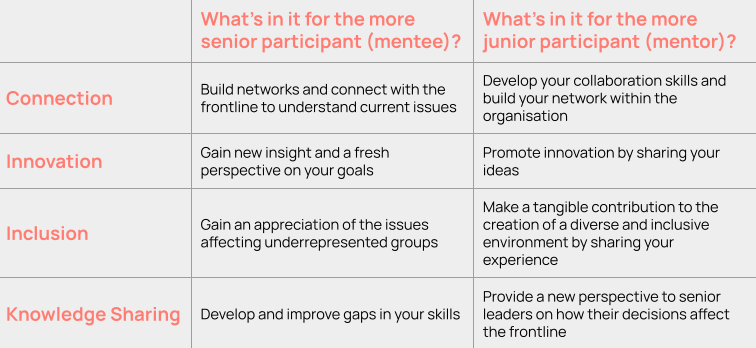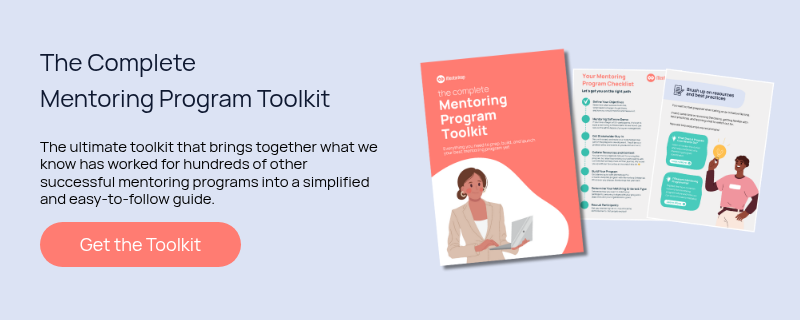What is Reverse Mentoring?
Reverse mentoring is a one-to-one relationship that is usually between a traditionally experienced, senior executive and an individual usually described as their junior. In reverse mentoring, the younger or less experienced person mentors their counterpart to increase knowledge in non-traditional areas that don’t form part of a traditional experience hierarchy. Some examples may of this may include providing insight into a different generation’s values and experiences, opening up to another person’s cultural background, or gaining knowledge into the lived experience of those with differing physical or mental abilities.
This exchange of knowledge allows both parties to benefit from the mutual support and growth that comes from working together to reflect on their own and one another’s experience of the world.
In traditional mentoring, a mentor is expected to be more senior and experienced than their mentee. However, reverse mentoring recognizes that there are skill gaps on both sides, and each person can address their challenges with the help of the other’s strengths.
Joining a reverse mentoring program is a great way to progress your career. Why? Well, for starters, you’ll receive help and guidance from other people and/or expand your support and leadership abilities by helping others grow.
Reverse mentoring can serve many functions, but in any form it takes, it creates a space in which each person in the relationship is able to bring their own input and expertise to the table. This offers everyone different and diverse experiences that are all equally valuable.
Benefits of Reverse Mentoring for Organizations
Retention
What’s more, it can be a great way to retain millennial talent. As the biggest generation currently in the workforce, and one that likes to switch jobs more frequently than previous generations (60% are open to a new job opportunity right now, and on average they’ll have four different jobs before age 32 and as many as 20 in their lifetime, according to Gallup), millennial retention is a hot topic.
How does reverse mentoring help? When realising that millennials were uninterested in working in financial services and those who did join the company left at higher rates than their older peers, CEO of Advisor Solutions Mark Tibergien told BNY-Mellon|Pershing, they should implement a reverse-mentoring program.
By so doing, HBR found that millennials were provided with the transparency and recognition they were seeking from management, resulting in a 96% retention rate for the first cohort of BNY-Mellon|Pershing’s millennial mentors.
Skills, Culture, and Diversity
But reverse mentoring isn’t only useful for retention purposes, it can also help older team members learn and master new technical or digital skills (harness social media for professional purposes), improve company culture (understand why people aren’t applying or are leaving and make cultural shifts to improve those areas or misconceptions) and promote diversity (improve leadership’s understanding of minority issues via person-to-person connections).
How to Make Reverse Mentoring Work for Your Organization
When implementing a reverse-mentoring program, you can do so in a variety of ways.
- Reverse-First Mentoring Match: Pair up mentoring partners in which the primary objective is for the younger or more junior of the two acts as the mentor.
- 50/50 Traditional/Reverse Mentoring Match: This relationship acts purposefully as a “two-way street”, encouraging both parties to teach, learn, and grow as individuals while developing a stronger, more egalitarian relationship.
The irony here, of course, is that most mentoring relationships have an element of reverse mentoring to them. When a mentor shares their experience, they are naturally forced to hold up a mirror to their own leadership style or behaviours which often uncovers new discoveries.
A Personal Advisory Board: The Personal Advisory Board isn’t one mentoring relationship, but many, resulting in one’s own personal board of advisors. One may act as a more traditional mentor, another as more of a mentee, and even another at the same professional level as you.
Ultimately, reverse mentoring can serve many functions, but in any form it takes, it creates a space in which each person in the relationship is able to bring their own input and expertise to the table, offering different and diverse experiences that are equally valuable.
If you’re interested in learning more about how your organization can benefit from embedding mentoring into all stages of the employee lifecycle, download the webinar kit for a series on this very topic.
Join Mentorloop’s Head of Sales for EMEA, Jess Benham as she discusses the benefits of embedding a culture of mentoring in your organization to support all 6 stages of the employee lifecycle.
Benefits of Reverse Mentoring for Program Participants
Before diving into how to be a great mentee (the more senior participant) and mentor (the more junior participant) when it comes to reverse mentoring, let’s first look at some of the benefits.
Connection
For mentees, reverse mentoring helps build networks and connects them to the frontline in order to better understand current issues.
On the other hand, it allows mentors to develop their collaboration skills and build their network within the organization.
Innovation
Mentees are able to gain new insights and a fresh perspective on their goals, while mentors are able to promote innovation by sharing their ideas and sharing their knowledge.
Diversity, Inclusion, Equity, and Belonging
Mentees will be able to gain an appreciation of the issues affecting under-represented groups, whereas mentors will make a tangible contribution to the creation of a diverse and inclusive environment by sharing their experiences.
Mandatory diversity training can only do so much in the face of the difficulty of fostering belonging and understanding. Creating opportunities for conversations through DEI mentoring programs mean you avoid performative actions and ensure real, lasting change towards a more inclusive and equitable working environment or community. Award-winning organizations like USTA have created cross-cultural mentoring programs to close the gap and build a culture of belonging.
Knowledge Sharing
While mentees develop and improve gaps in their skills, mentors can provide a new perspective to senior leaders on how their decisions affect the frontline of the workplace.

Reverse Mentoring Areas That Programs Aim to Improve
While the benefits of reverse mentoring programs are highly positive, there are often key outcomes that are underlying. Some examples of these are areas organizations wish to improve in their teams:
- Biases that exist in the workplace (both conscious and unconscious)
- Bridging the generation gap between different generations and their work ethics
- Smoothing the introduction of new technologies to the company
- Explore opinions or views of various cultures that may conflict with their own
How To Be A Great Mentee In Reverse Mentoring
In order to be a great mentee—remember, that’s the more senior participant—when you’re paired up with your reverse mentoring partner, here are some suggestions:
- Take responsibility for the mentoring relationship: Don’t let maintaining the relationship fall solely on your mentor’s shoulders; do your part!
- Initiate and attend regular meetings with your mentor: Make sure you’re actively engaged in the partnership—it takes two to tango.
- Spend some time creating trust: As a mentee, you must be willing to let down some of your barriers. This is especially important in reverse mentoring, since the more junior person (the mentor) may feel uncomfortable mentoring a senior to begin with.
- Set clear goals for your mentoring relationship: And don’t forget to share them with your mentor!
- Be receptive and open to feedback: After all, strong communication is the bread and butter of any relationship; don’t be afraid to give and receive feedback.
Implement action plans and share your progress with your mentor: This will ensure both of you are on the same page.
How to Be A Great Mentor In Reverse Mentoring
When it comes to being a great mentor—the more junior participant—in a reverse mentoring relationship, here are some tips:
- Be available to meet as agreed: When you’ve decided on a meeting schedule, try to stick to it as best you can.
- Listen to the needs of the mentee: You want to support your mentoring partner as best as possible, so make sure to really listen to what they want to get out of the reverse mentoring program.
- Fulfill any promises made to the mentee: Keep your word! This will help you both establish a strong foundation of trust.
- Take the relationship seriously: Remember, this relationship is meant to help you grow both personally and professionally.
- Develop your own skills as a mentor: We can all always improve; actively invest in becoming a better mentor for yourself and your mentee.
- Be honest with the mentee about how the relationship is going: Don’t try to sugarcoat any difficulties you’re having; be upfront and honest with one another.
Maintain the privacy of the mentoring relationship: The mentee may be sharing vulnerable information with you, and confidentiality is critical to building any strong relationship based on trust.
Ultimately, by clearly setting expectations, outlining what the goal of the mentoring program is, what the focus of the relationships should be, and providing some techniques partners can use to manage their relationships, your reverse mentoring program can not only be an excellent experience for everyone involved but lead to greater team unity overall.
Learn more: 10 Key Qualities And Habits Of Highly Effective Mentors and Mentees.
Where did Reverse Mentoring come from?
Let’s go back a bit and have a look at who created reverse mentoring and how it evolved.
Reverse mentoring was originally created by the former CEO of General Electric, Jack Welch. In the late 1990s, he published an article titled “Reverse mentoring: Learning from the future” in which he explained how he used this program to help employees understand how their companies could be better run in the future by benefitting from the internet.
So as reverse mentoring approaches its thirties, the concept too has evolved over time and continues to increase in popularity. As it challenges the traditional view of mentoring, each day it becomes more relevant in ever-changing workplaces and as society progresses. Here at Mentorloop, we see successful reverse mentoring programs created each day.
Your employees are your most valuable resource – and if you want to win, listen to them.
Reverse mentoring is a great way to get your employees to feel empowered and valued, which will keep them engaged in the process. It also helps you create a more diverse and inclusive workplace, which is important if you want to stay competitive in today’s global economy. After all, diversity is not just about making sure everyone looks different from each other; it’s about bringing different perspectives and ideas into the fold.
In order for reverse mentoring programs to succeed, however – especially for first-time programs – it’s crucial that both parties are on board with what they’re doing before any actual training begins. If either party isn’t comfortable with being an “elder” or senior mentor (or vice versa), then things can go south pretty quickly — even before they start!
Reverse mentoring can be a powerful tool for increasing employee engagement and improving productivity. The trick is to make sure everyone understands how the program works, so they can take advantage of it when necessary. Make sure employees know they have access to mentors at any time, especially those who may not have mentors at all or are new to the company. This will help them become more comfortable with the process and feel supported throughout their journey as well.
Ready to get started with a remote mentoring program? Learn more about how our mentoring software works here.





